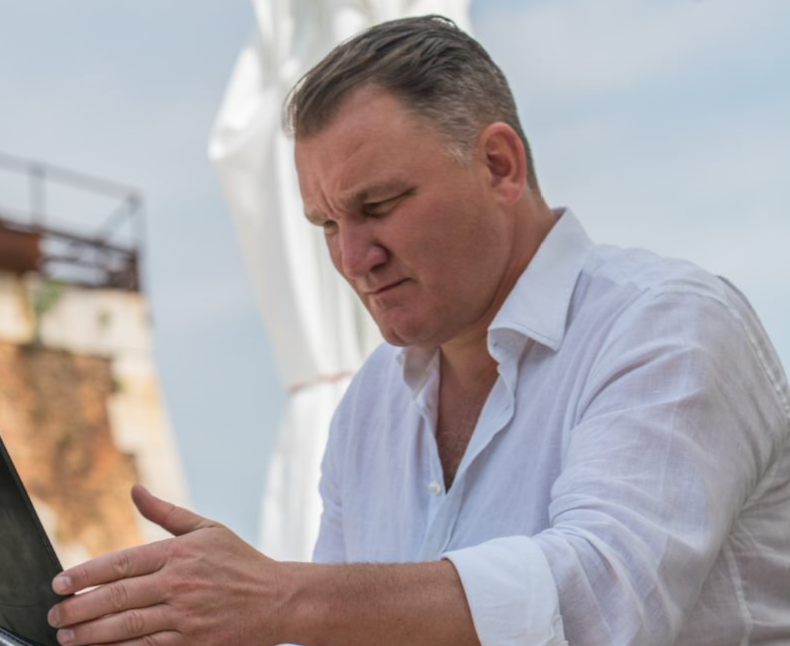
"The most formative experience of my life occurred within two years of leaving Cambridge when I worked in Bosnia immediately post-conflict ... for the UK Government and the UN war crimes tribunal, I investigated crimes against humanity and genocide."
On first meeting radical theologian Don Cupitt, he joked that he received sacks of hate mail for his unorthodox beliefs and frequently had members of the University’s Christian Union pray for the souls of his students outside the door of his tutorials. I knew we were going to get on famously.
It was perhaps not such a surprise that I went up to Emmanuel to study at the Faculty of Divinity under the watchful gaze of Cupitt, as I had always been interested in questions of religion and ethics. As I child I could not understand how people could be intolerant of other religions when one’s faith was simply an accident of birth.
At Sherborne School I confounded the Headmaster by saying I would not be a hypocrite and turn to face the alter or kneel; belief was not the same thing as convention. It was only the fact I had a place at Emmanuel that stopped me getting into trouble. Clearly, religion was not a subject I was indifferent about.
Cupitt, now 86, describes himself as a Christian non-realist, by which he means that he follows certain spiritual practices and attempts to live by ethical standards traditionally associated with Christianity but without believing in the actual existence of the underlying metaphysical entities (such as "Christ" and "God").
With a growing interest in how religion shapes human development, society and conflict, and a concern that I lacked the intellectual curiosity to master Sanskrit or Aramaic, the move to Social and Political Sciences for Part II of my Tripos seemed a natural evolution, as did a career since then seeking to mitigate, manage and prevent instability, conflict and violence.
The most formative experience of my life occurred within two years of leaving Cambridge when I worked in Bosnia immediately post-conflict.
Ethno-sectarian, intercommunal conflict had engulfed the former Yugoslavia and for much of the next eight years, for the UK Government and the UN war crimes tribunal, I investigated crimes against humanity and genocide.
The perpetrators of those crimes sought to legitimise their nationalism, greed and intolerance with religious justifications, but it was the failure of the international community’s response, epitomised by the fate of the infamous UN safe area (or ‘unsafe area’ as it came to be known) of Srebrenica, that called into question many of the International Relations norms I had studied at Cambridge.
The Balkan wars were to shatter the hope that the collapse of the Soviet Union would usher in the end of history and that conflicts would abate as a result.
Following stints in Pakistan on and immediately after 9/11 and in the West Bank and Gaza seeking to promote dialogue between Israelis and Palestinians, I went back to university to study political violence and terrorism.
Whilst St Andrews was marvellous, the experience of remote studying (which seems so normal today) was a challenge with a bad internet connection from e.g. Yemen and simply was not the same as the immersed intellectual enquiry of Cambridge.
Now running a company that specialises in helping the most vulnerable and those impacted by conflict and instability, I am driven by the imperative to do what I and my team can, fully cognisant of the extent of human suffering and barbarism. After many years of working in Syria, it is easy to be cynical.
Despite having supported the development of the White Helmets Civil Defence capability at the start of the conflict, the words of one of those brave individuals stays with me; ‘why are we keeping people alive today in order to die tomorrow?’. That civilians, despite the risks, still rush to help those impacted by indiscriminate shelling and barrel bombs reminds us of the enduring nature of resilience, humanity, hope and faith, however one perceives the latter.
We live in a time of significant challenges to the rules-based order and multilateralism, to say nothing of the pandemic, Brexit, climate change and global inequity. Intolerance, indifference, and incompetence mean that institutions such as the United Nations or the International Criminal Court are increasingly undermined or ignored. In short, we have our work cut out to ensure inclusive, sustainable, equitable growth and development.
My motivation is underpinned not by a conventional religious conviction but an attempt to live by the ethical standards that have inspired the great religions – it would appear 25 years on, the teachings and wisdom of Don Cupitt and many others at Cambridge have left their mark.
Alistair Harris OBE is the CEO of ARK Group
Find out more about Alistair's work and ARK on their blog>>
